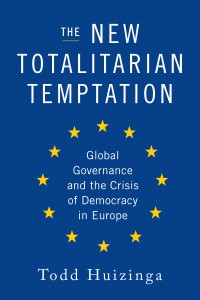 The New Totalitarian Temptation “is the best book ever written about the European Union,” says John Fonte, who just reviewed it for National Review. Acton’s director of international outreach, Todd Huizinga, wrote Totalitarian Temptation based on his experience with the U.S. Foreign Service in Brussels, Luxembourg, and Germany. As an American who spent two decades living and working in Europe, he has a few things to say about the European Union and its decline into a soft utopia.
The New Totalitarian Temptation “is the best book ever written about the European Union,” says John Fonte, who just reviewed it for National Review. Acton’s director of international outreach, Todd Huizinga, wrote Totalitarian Temptation based on his experience with the U.S. Foreign Service in Brussels, Luxembourg, and Germany. As an American who spent two decades living and working in Europe, he has a few things to say about the European Union and its decline into a soft utopia.
Fonte, a senior fellow at the Hudson Institute, says:
At the core of the EU is the belief in supranationalism. The proponents of the EU consciously portray its supranational institutions as a model for “global governance.” In this intended utopia, all nation-states in the future would cede national sovereignty, and thus political and legal authority, to supranational institutions, just as today the European Court of Justice is a higher legal authority for Germans than their own courts, and most British laws originate not in the House of Commons but in the European Commission in Brussels. From the EU perspective, supranationalism is necessary to achieve world peace and global human rights.
In clear and cogent language, the author meticulously details the history of the EU from its idealistic beginnings in the ashes of World War II, through the creation of the euro more than a decade ago, to today’s refugee-migrant crisis. He laments that, “after 65 years, the EU has conclusively shown itself to be inherently undemocratic, unaccountable and unresponsive to voters.”
From the beginning, the intellectual architects of European integration sought to limit democratic sovereignty in the name of supranational governance. The strategy to advance integration has been dubbed the “Monnet method” after its foremost theorist and practitioner, Jean Monnet. The method envisioned a gradualist approach that started with consolidating the economic sphere, but with the ultimate aim of European political integration — while obfuscating the extent of this transfer of power from the citizens of the member states, through a conscious policy of “constructive ambiguity.”
To read the entire review, “The EU’s Soft Utopia,” visit National Review and for more information about the book, including an excerpt, visit newtotalitariantemptation.com. The book can be purchased through Amazon or in Acton’s Book Shop.

